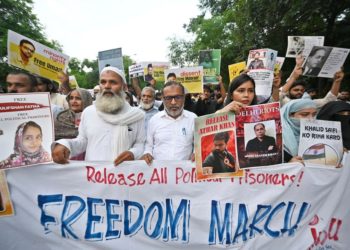When published a letter to allies on his social network Truth Social on Saturday, Brussels braced for the usual storm.
Trump accused member states of weakening the alliance’s negotiating position and bargaining power in relation to by continuing to buy Russian . He vowed that the US would be ready to impose “major sanctions” on Russia once all NATO countries had stopped such purchases.
“I am ready to ‘go’ when you are,” he wrote.
He also called for on China, which he claimed would end this deadly, but ridiculous, war.
For many here in Brussels, the message might not have been entirely unwelcome. , two EU member states still heavily reliant on Russian energy, to fall in line with sanctions. Trump’s demand suddenly puts Hungarian Prime Minister and Slovakian Prime Minister on the defensive, even if few believe that Trump will follow through.
Hungary and Slovakia under pressure
Ian Bond, deputy director of the Centre for European Reform, sees a gap between Trump’s rhetoric and his actions.
“The EU has dramatically reduced its reliance on Russian oil and gas,” he told DW.
Ironically, he notes that the two countries doing their best are not only friendly with Russian President , but .
“If Trump wants the EU to stop buying oil from Russia, then leaning on his best friends would probably be a good move. I haven’t seen any sign that he’s doing that, however,” he told DW.
For years, the has tried to push the Hungarian and Slovakian governments to diversify away from Russian energy. Progress has been slow, blocked by both government’s insistence on higher costs and established infrastructure. Orban, in particular, has defended Russian-backed projects, such as the Paks II nuclear plant in southern Hungary, despite legal challenges in Brussels.
Bond argues that Trump’s letter tries to shift responsibility away from the White House. “This seems to me like Trump is looking for an excuse for continuing not to do anything. We’ve gone through the phase of ‘I’ll give him another two weeks,’ and months later, Putin has still not stopped the war. Now we’re into the stage of ‘I would do this, but I need my allies to act first.’”
Turkey remains outside EU control
Many in Brussels agree that Trump’s demand that is harder to realize. Since 2023, Ankara has been the third-largest buyer of Russian oil, after China and India, according to the Centre for Research on Energy and Clean Air. It has given no sign of cutting those ties.
Unlike with EU states, Brussels has little leverage here. For European diplomats, Turkey illustrates the gap between NATO and the EU. Trump’s conditions, covering all alliance members, are more ambitious than anything Brussels could realistically deliver.
Rhetoric versus reality
Bond argued that by setting such a high bar for US sanctions, requiring all NATO members to end Russian oil and gas imports, Trump may have created conditions that are impossible to meet, shifting the blame onto the Europeans. That risks delaying the Trump administration’s alignment with the against Russia.
Bond points out that Trump’s economic threats are not always connected to real strategy, but also to blackmail. “It’s very telling that almost the only country in the world on which Trump has not imposed tariffs is Russia,” he said. “Trump managed to impose tariffs on uninhabited islands in April, so I don’t see any reason why he shouldn’t impose tariffs on Russia.”
Other ways to apply pressure to Russia
Bond argues that Europe still has more tools to constrain the Kremlin, such as going after the so-called “shadow fleet” of aging oil tankers the Russia is allegeldy using to circumvent oil sanctions.
“More pressure on the [Russian] shadow fleets would be a good thing. The UK sanctioned another 70 ships last week,” he explained.
He also wants to see the EU put more pressure on the US, especially when it comes to oilfield services. “The company SLB, formerly Schlumberger, has continued to invest in Russia. That is helping Moscow preserve production capacity at a time when we should be trying to reduce it.”
Meanwhile, Russia shows no sign of ending its war. Over the weekend, , the second NATO violation in less than a week following . For analysts in Brussels, such incidents underline how Moscow is edging the alliance ever closer to direct involvement in the conflict.
Europe may welcome Trump’s sudden alignment on sanctions in theory, but the fundamentals remain unchanged. Hungary and Slovakia resist, Turkey remains outside EU control, and Russia shows no sign of compromise. For policymakers in Brussels, Trump’s words could best be seen as a leverage inside the bloc, .
As Bond put it, Europe must keep doing what it can: cutting Russia’s revenues, closing loopholes and pushing the White House to go further. The war in Ukraine will be shaped less by Trump’s Truth Social posts than by Europe’s ability to maintain unity and convince the Kremlin that time is not on its side.
Edited by: Davis VanOpdorp
The post Why Trump’s letter to NATO won’t shift EU’s course on Russia appeared first on Deutsche Welle.




